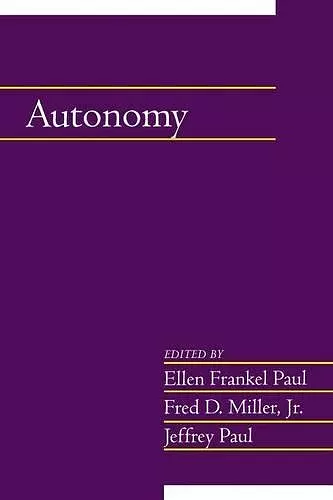Autonomy: Volume 20, Part 2
Ellen Frankel Paul editor Jeffrey Paul editor Fred D Miller, Jr editor
Format:Paperback
Publisher:Cambridge University Press
Published:30th Jun '03
Currently unavailable, and unfortunately no date known when it will be back

This volume explores the concept of autonomy in moral and political philosophy, examining its implications for public policy and the debate over its definition, including perspectives from notable philosophers like Kant and Spinoza.
Autonomy: Volume 20, Part 2 delves into the concept of autonomy, a key principle in moral and political philosophy. The book highlights the ongoing debates surrounding the definition of autonomy, its implications for public policy, and the theoretical foundations that support or challenge the concept. Autonomy is generally understood as a form of self-governance or self-direction, with significant contributions from influential thinkers such as the Stoics, Spinoza, and particularly Immanuel Kant, who have shaped contemporary understanding of the term.
The volume explores various interpretations of autonomy, with some theorists emphasizing the importance of higher-order desires in motivating actions, while others argue for a conception rooted in reason and moral duty that transcends emotional influences. This distinction raises questions about the relationship between autonomy and freedom, prompting discussions about what types of freedom—whether from coercion, psychological constraints, or material necessity—are most relevant to understanding autonomy.
Furthermore, the essays in this collection examine the implications of different political systems on autonomy, questioning whether capitalism, social democracy, or socialism better supports individual self-governance. By addressing these critical issues, Autonomy: Volume 20, Part 2 offers a comprehensive analysis of the role autonomy plays in both philosophical discourse and public policy, encouraging readers to reflect on the complexities and nuances of this foundational concept.
'this book brings together an impressive array of academic expertise whose contributions cover historical, ethical, political and even psychological perspectives of the concept and its application.' The Philosophical Quarterly
ISBN: 9780521534994
Dimensions: 228mm x 153mm x 20mm
Weight: 486g
360 pages